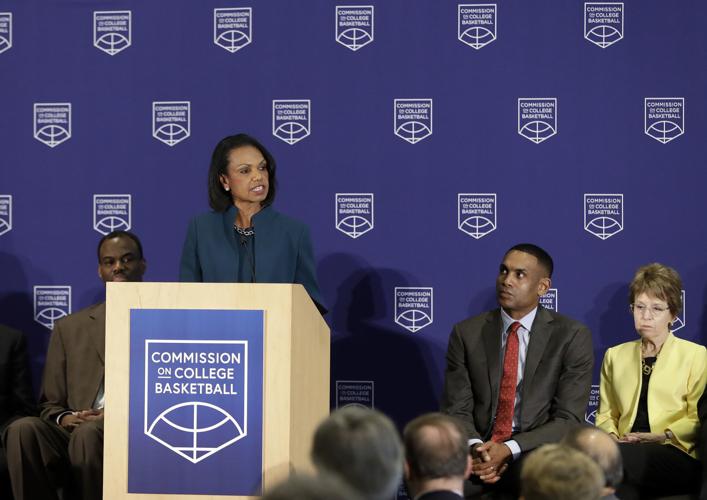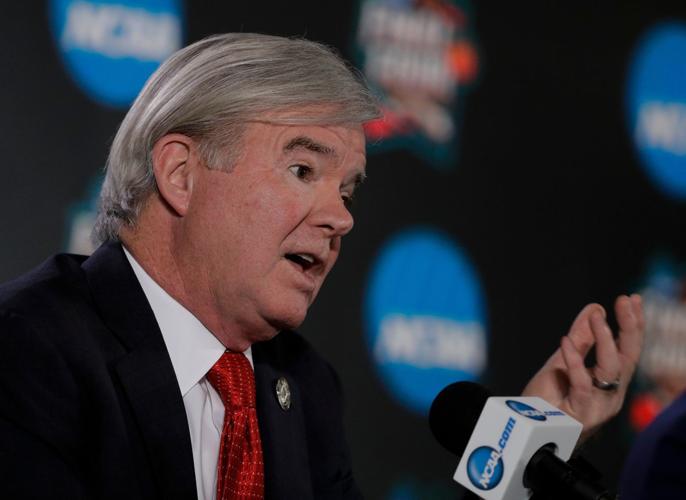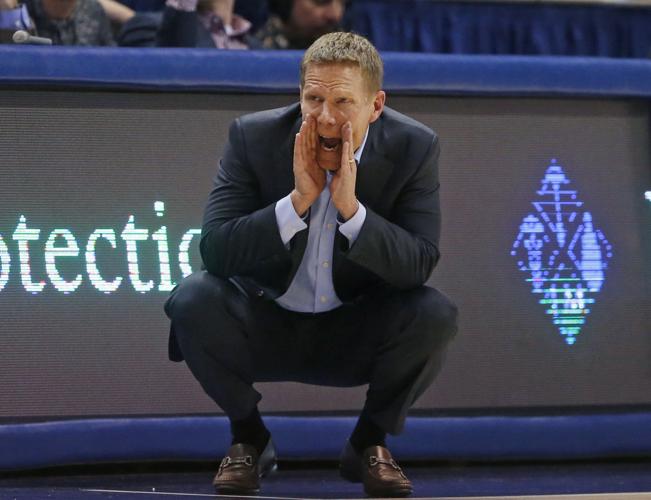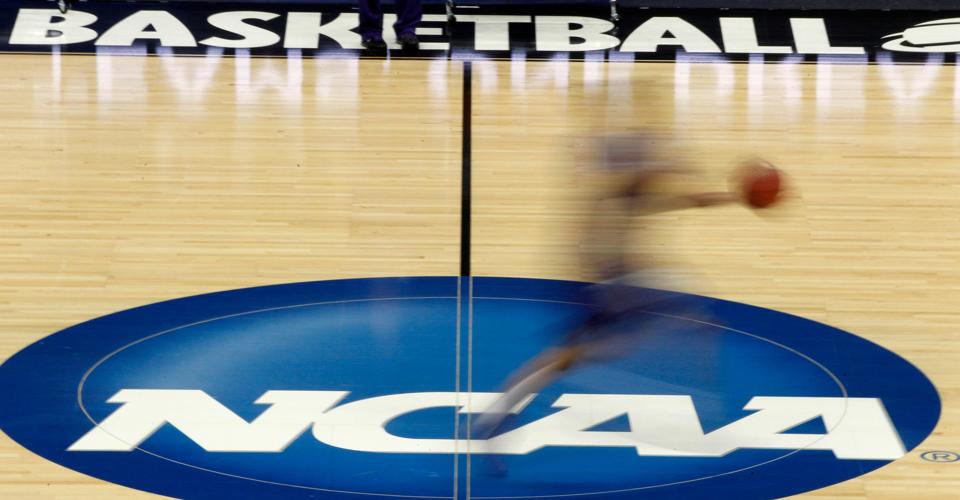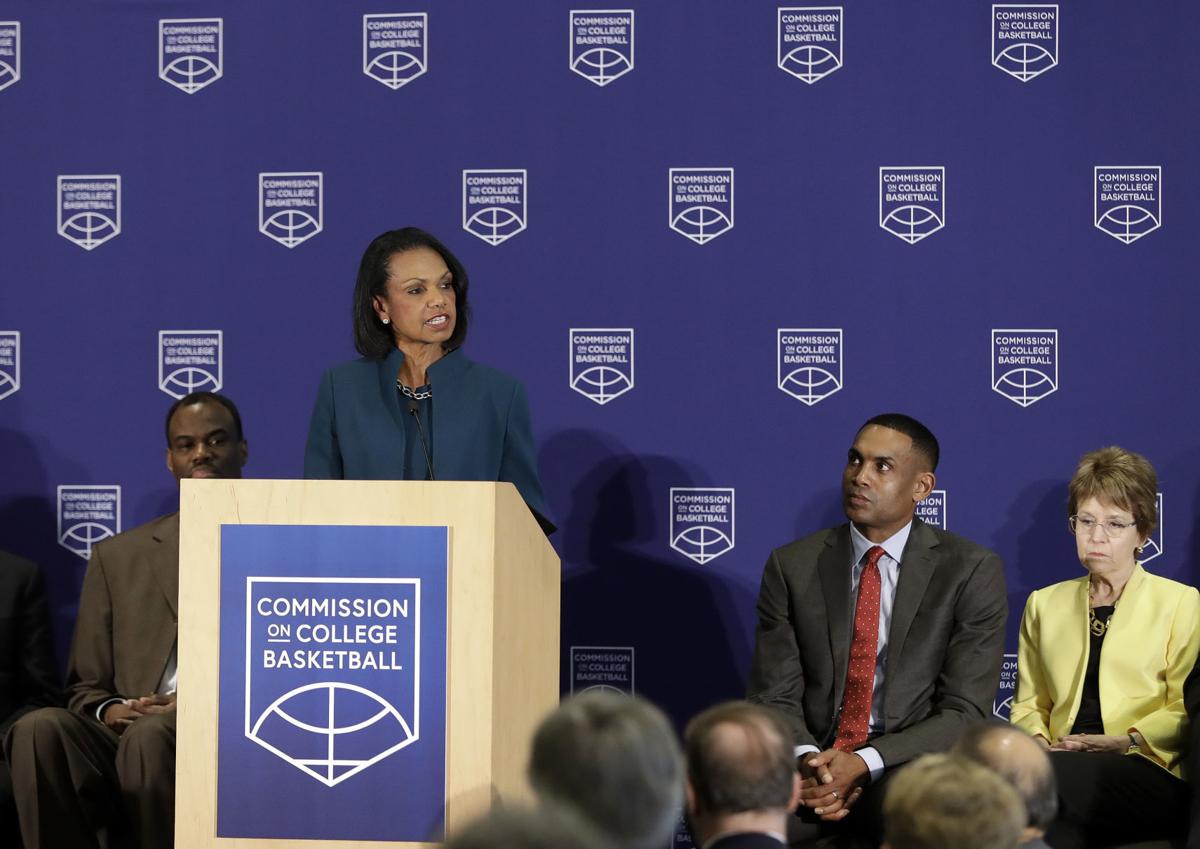LAS VEGAS — Of the 2,986 games that Hal Pastner crammed into his Las Vegas Classic basketball tournament, this one, he’s convinced, is special.
It is late Thursday morning inside at Spring Valley High School’s main gym, an air-conditioned basketball refuge on a stifling 110-degree day. A nearly half-full crowd is on hand, most to see the powerhouse Oakland Soldiers and their perennial collection of high-major talent. But the Broward County Cougars are making a game of it, at least early on (they lost by 27 eventually).
“Look at these kids,” Pastner says. “They’re from South Florida. They look like they’re small. They did a phenomenal job against the Oakland Soldiers, and probably each one of these kids is going to get an opportunity (in college).
“With a camp, they probably would have gotten nothing. They probably wouldn’t even get invited.”
The ever-energetic father of former UA player and current Georgia Tech coach Josh Pastner, Hal could go on, and does.
He talks about the three games that ESPN will cover, the fact that Carmelo Anthony and Chris Paul are making guest coaching appearances for teams they sponsor, and about the fact that he turned away teams after accepting 1,229 of them.
But the camps, Pastner says, could change everything.

NCAA President Mark Emmert speaks during a news conference at the Final Four in San Antonio.
Installing summer camps are one of the key recommendations from the NCAA’s Commission on College Basketball, potential replacements for the often shoe-sponsored tournaments that dominate the recruiting trail each spring and summer.
The recommendations from what is informally known as the “Rice Commission,” after chair Condoleezza Rice, are currently being studied by a number of working groups and are expected to be voted on next month. They include possibly holding NCAA-run high school team camps in June and USA Basketball-run camps in July.
The idea, of course, is to lessen the influence that shoe companies have over basketball recruiting, after two Adidas executives were among those arrested — along with Arizona assistant coach “Book” Richardson and three other coaches — last September as a result of the federal investigation into college basketball.
Representatives for Adidas and Under Armour declined to comment for this story, and Nike could not be reached for comment.
For now, nobody’s really sure how it could all play out.
The NCAA is expected to keep allowing coaches to view shoe-company-sponsored camps in April. But the July period, which annually concludes with a steroidal collection of events in Las Vegas, could be superseded by regional camps that involve 2,500 or so teams run by USA Basketball.
Or there may be a hybrid schedule of some sort, at least for now.
“We are for adding events. We’re not saying ‘shut it down,’” USA Basketball CEO Jim Tooley said Friday, after a USA senior team mini-camp practice at UNLV. “We’re in favor of higher standards and more transparency to make sure people are doing things the right way. And there’s a lot of good there already. We want to make it better.”
Tooley said one discussion he’s had involves setting up four regional camps of 700 players each, with half of the players coming in the first few days of the week and the other half in the latter part . That means a total of 2,800 players would get invited.
However, there are roughly that many teams playing in Las Vegas alone this week: In the Las Vegas Classic, the Fab 48, the Under Armour Association Finals, the Rebound Hoops tournament, the Las Vegas Summer Showcase and others.
“That’s why we don’t want to blow up the universe,” Tooley says. “The universe of kids is about 19-20,000 per class. So if we did something for 500 or 1,000 or 2,000, what about 2,000 and up?
“As the national governing body, our job is to help grow the game, not stifle it.”

Gonzaga coach Mark Few says sweeping changes to the NCAA and recruiting events could be a long process. “I’d be more apt to just make some subtle necessary changes to do our best to clean it up that way,” he said.
Replacing all the summer recruiting events as they are now also will be costly, more than the $9 million number being thrown around this month, Tooley said.
The NCAA is expected to pay for it by dipping into its massive media-rights pot, a sum that will reach nearly $1 billion a year with its most recent extension to 2032.
Meanwhile, Tooley said USA Basketball is in discussions about providing the manpower and other infrastructure. Although USA Basketball already runs youth events and national team competitions all summer, Tooley said he’s open to the idea of adding camps.
Especially if it can help the game.
“We want to be a bigger influence,” he said. “Does that does that mean it takes away the other influencers? No. It has to be a holistic approach. You have to have strong enforcement. Because if you do find something bad, you have to take that seriously so it’s not a slap on the wrist and the cost of doing that doesn’t outweigh the consequences.”
As of now, the travel-ball tournament system — often called “AAU basketball” — is an opportunity for thousands of players and also one-stop shopping for college coaches.
Typically, Nike, Adidas and Under Armour all run their own circuits, meaning their teams will mostly play just against each other, though there is some cross-pollination in independent tournaments and showcase events.
Against a Nike rep’s stated wish on Twitter, the Fab 48 even featured a game Wednesday between the Compton Magic, the Adidas circuit champ, and Team Takeover, the Nike Elite Youth Basketball League champ. The Magic won an overtime thriller before a sold-out crowd of fans and coaches at Bishop Gorman High School.
“The basketball game Nike and Adidas didn’t ever want to see finally happened, and it was fantastic,” blared a CBS Sports recap of the event.
Coaches and organizers say the whole system benefits high- and low-major coaches alike, a chance to see so many prospects nearby in a high-level environment.
“It helps a school like us budget-wise because I can bring myself and all three assistants,” Northern Arizona coach Jack Murphy said. “You’re covering the Las Vegas valley rather than jumping on flights and doing everything else.”
Murphy said he will adjust to whatever the NCAA believes is the right way to go, but says he grew up in Las Vegas working the tournaments and has seen plenty of good come from them.
“My thing is that Under Armour, Adidas and Nike do a great job of running these events,” Murphy said. “I mean, (Nike’s Atlanta-area) Peach Jam is one of the top events of the summer, and this week the Under Armour finals is fantastic and last week in Southern California there was the Adidas finals.
“You know where the players are going to be, they’re well coached, well organized and I think they do a great job.”
They also have played by the NCAA’s rules.

College basketball spent an entire season operating amid a federal corruption investigation that magnified problems within the sport.
Dinos Trigonis, longtime coach of the Belmont Shore travel team and organizer of the Fab 48 at Bishop Gorman, says he has to submit lists of players to the NCAA, documenting that they are eligible to play.
In all tournaments, the stands at each gym are strictly divided — fans, parents and friends on one side, and coaches and media on the other. Security guards ensure nobody crosses the line.
The Fab 48 does it that way, too, though Trigonis finds it laughable.
“In December, we have a tournament here with high school teams, and Sean Miller can sit next to (incoming UA freshman) Brandon Williams’ dad and there’s no problem,” Trigonis said. “But god forbid he sits with him this week. If Sean Miller — or anybody else for that matter — is inclined to cheat, you’re telling me in December he’s not going to, but in July he’s itching, he’s foaming at the mouth to do it? It’s a joke.”
While starting up a load of team laundry in a small room adjacent to Bishop Gorman’s two main courts Thursday evening, Trigonis was clearly heated over the topic. He says his Fab 48 is not largely underwritten by a shoe company, but by corporate sponsorships, entrance fees, player information guides to coaches. Yet the NCAA has tried to poke under his hood.
“The NCAA called me and wanted to do a survey. One of the very first questions was, ‘Can you give us your 2017 tax returns?’” Trigonis said. “What does that have to do with a college coach paying a player? Where is that relevant?
“With all due respect, we had a good conversation, but show me how it’s relevant to solving your problem.”
Longtime recruiting analyst Clark Francis says part of the problem is that the commission didn’t have a representative from within the travel-ball circuit.
“I don’t think they have a clue,” Francis said. “They have people who have no idea about how this works, they’ve never been to it.”
Francis, Pastner and Trigonis said there’s a danger there, too: If a new system results in fewer opportunities for players and/or event operators, legal action may follow.
“You’re gonna see a class-action,” Trigonis said. “It’s already in motion. I think they got wind of it.”
Trigonis said an anti-trust argument could stem from “mom and pop” operators like himself, and maybe from players and their families, too.
Maybe even players from, say, Broward County.
“Any player who doesn’t get invited to the camps, their parents could file a class-action,” Francis said. “They think their kid is good enough to get a Division I scholarship. Maybe not, but nobody knows. The only thing that’s going to hold them back is, to beat the NCAA you better have millions of dollars and three or four years to go to court.”
In addition, the NCAA can’t actually stop the shoe events, just the coaches from watching them in person. So even if the NCAA allows coaches to attend only the new camps, shoe companies could opt to hold their own tournaments at the same time, and Pastner says the top players would show up at them.
Coaches might watch from afar, too.
“It’s even more irrelevant now because we have live stream,” Trigonis said.
So, to recap: The changes might benefit the college game overall, but they also could create potentially angry event organizers, angry coaches, angry players and angry parents.
Maybe.
“My personal hope is we all just take a deep breath and kind of slow down,” said Gonzaga coach Mark Few, who is in Las Vegas for recruiting and to assist USA Basketball’s national team mini-camp. “We all just need to slow down and not rush into something without really looking at what the effects are gonna be.
“We’re talking about so many things here — it’s not just summer recruiting, it’s (potentially) letting agents in, it’s one and done, it’s how we police and basically our whole kind of prosecutorial approach — how we administer rules and penalties. I don’t think it’s something we should have to get out in a month.”
At the earliest, changes would unfold next summer, and even that’s a problem for Pastner, who says he needs to plan a year ahead of time considering the massive scale of his Nike-sponsored event.
“This is one of the hardest things I’ve ever done,” Pastner said.
Tooley, for one, said it wouldn’t be a complete overhaul overnight. The possibility of holding four camps with 700 players each is just one possible way to start.
“Version 1.0 is gonna look different than version 2.0,” Tooley said. “You’ve gotta get in and get your lessons learned.”
Few is taking a careful approach, too.
“It’s an enormous entity, and it might have some shortcomings like very entity does, but I don’t know that we need to blow the whole thing up and try to reinvent it,” Few said. “I’d be more apt to just make some subtle necessary changes to do our best to clean it up that way.”
“It’s something that we need to spend some serious time on, and if we do it right we’ll have set this up for years and years to come.”


